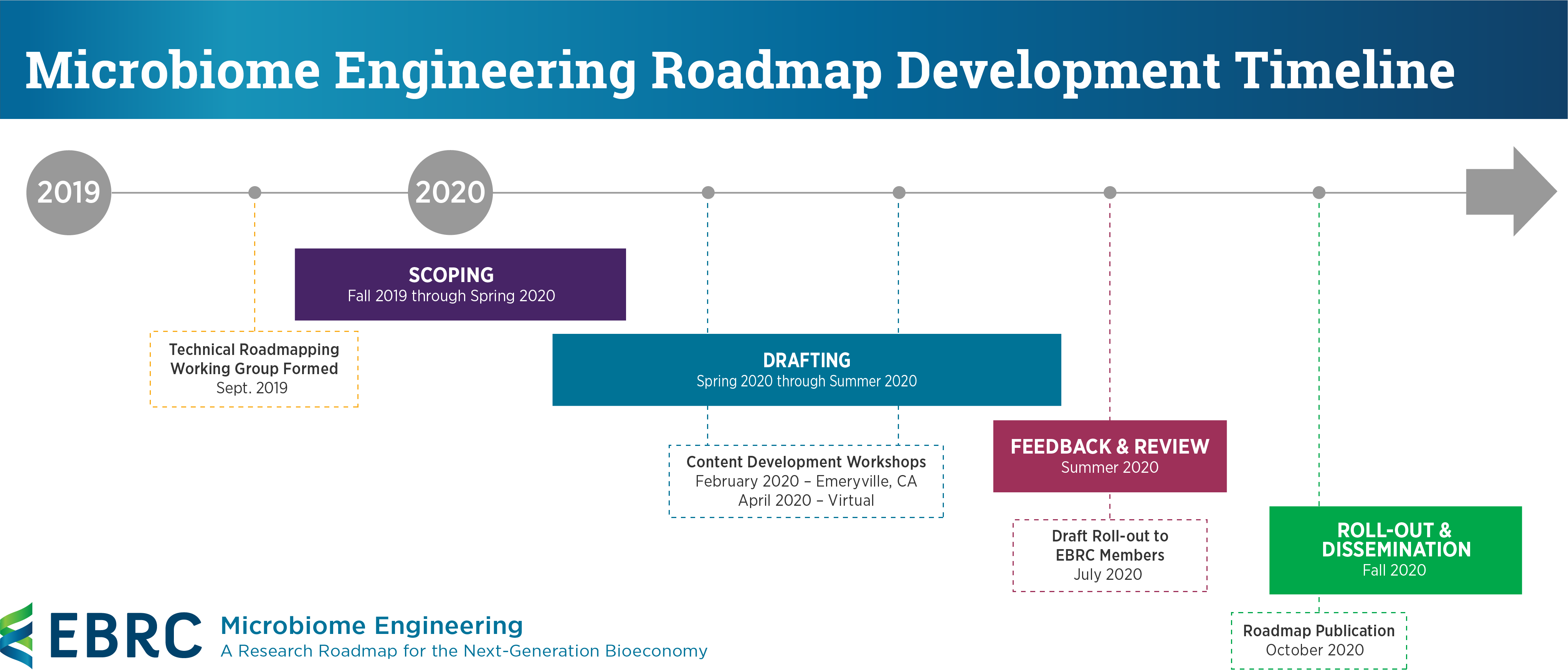The full roadmap website is the best way to navigate the content and will always be the most up-to-date. We recognize, however, that there are some circumstances where the full archival document for Microbiome Engineering: A Research Roadmap for the Next-Generation Bioeconomy will be helpful.
Download PDF
How to cite Microbiome Engineering
Engineering Biology Research Consortium (2020). Microbiome Engineering: A Research Roadmap for the Next-Generation Bioeconomy. Retrieved from http://roadmap.ebrc.org. doi: 10.25498/E4QP4T
What is Microbiome Engineering
Microbiome Engineering: A Research Roadmap for the Next-Generation Bioeconomy is a critical assessment of the current state of microbiome engineering and areas of anticipated research and development in the next twenty years. It also details how those scientific advancements can be applied across different industry sectors. The roadmap aims to serve as a “go-to” resource for scientists working to engineer microbiomes, as well as policymakers interested in advancing microbiome engineering.
Microbiome Engineering examines technical progress needed to advance microbiome engineering (Technical Themes) and details how these advances can be used to develop engineered microbiomes for specific applications (Application Sectors). The roadmap is comprised of three Technical Themes: Spatiotemporal Control, Functional Biodiversity, and Distributed Metabolism. Spatiotemporal Control considers how to engineer microbiomes for precise, predictable position and function in space and over time. Functional Biodiversity discusses how to engineer microbiomes based on functionally similar, but taxonomically diverse, collections of organisms to increase the interoperability of engineered microbiomes in different environments. Finally, Distributed Metabolism focuses on designing microbiomes that leverage the unique metabolic capabilities of individual microbial species or taxa to collectively produce and/or degrade specific compounds. Several technical challenges are broadly applicable and would be necessary for advancing all three Technical Themes. These challenges were captured under Transformative Tools & Technologies and will be some of the most critical areas of research for advancing microbiome engineering. In particular, substantial efforts will be needed to help advance microbiome models, cellular signaling and communication, and computational methods for predicting microbiome design, growth, and function.
The Application Sectors are derived from Engineering Biology: A Research Roadmap for the Next Generation Bioeconomy: Industrial Biotechnology, Health & Medicine, Food & Agriculture, Environmental Biotechnology, and Energy. Within each Sector we examine how advancements in microbiome engineering can help address several broad societal challenges. Specific technical achievements are identified that would contribute to solving these societal challenges, demonstrating the diverse potential applications of microbiome engineering.
2020 Process
Microbiome Engineering: A Research Roadmap for the Next-Generation Bioeconomy is a follow-up to the 2019 EBRC Roadmap Engineering Biology: A Research Roadmap for the Next-Generation Bioeconomy. It further elaborates on the role of engineering biology for microbial biomes and consortia. The topic was covered briefly in Engineering Biology, but many members of the engineering biology community recognized that microbiome engineering presents unique technical challenges and potential applications to warrant a more in-depth examination.
Over the course of late 2019 and the first half of 2020, the EBRC Technical Roadmapping Working Group helped develop the framework and content of this roadmap. Our work over conference calls was intended to be supplemented by several in-person workshops, but in the wake of the SARS-CoV-2/COVID-19 pandemic we were forced to adjust and adapt. Instead, this roadmap is the product of a two-day writing workshop, supplemented with countless Zoom calls and Slack messages during the spring and summer of 2020. Over forty faculty, industry experts, postdoctoral scholars, and graduate students all contributed their expertise to this roadmap, and this roadmap would not have been possible without them.

Copyright © 2020 Engineering Biology Research Consortium.